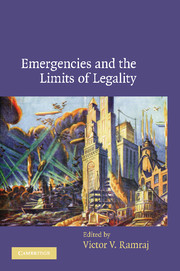Book contents
- Frontmatter
- Contents
- List of contributors
- Preface
- Introduction
- PART ONE Legality and extra-legality
- PART TWO Conceptual and normative theories
- PART THREE Political and sociological theories
- PART FOUR Prospective constraints on state power
- PART FIVE Judicial responses to official disobedience
- PART SIX Post-colonial and international perspectives
- 14 Exceptions, bare life and colonialism
- 15 The struggle over legality in the midnight hour: governing the international state of emergency
- 16 Inter arma silent leges? Black hole theories of the laws of war
- Index
- References
16 - Inter arma silent leges? Black hole theories of the laws of war
Published online by Cambridge University Press: 10 August 2009
- Frontmatter
- Contents
- List of contributors
- Preface
- Introduction
- PART ONE Legality and extra-legality
- PART TWO Conceptual and normative theories
- PART THREE Political and sociological theories
- PART FOUR Prospective constraints on state power
- PART FIVE Judicial responses to official disobedience
- PART SIX Post-colonial and international perspectives
- 14 Exceptions, bare life and colonialism
- 15 The struggle over legality in the midnight hour: governing the international state of emergency
- 16 Inter arma silent leges? Black hole theories of the laws of war
- Index
- References
Summary
Introduction
Let us consider the Gross–Dyzenhaus debate in light of recent controversy over applying the laws of war in the Bush administration's war on terror. David Dyzenhaus argues against having ‘black holes’, as he calls it, in the law. He criticises Oren Gross, who says that there are certain situations where officialdom may have to step outside the law – such as where an official commits torture under the now-famous ‘ticking bomb’ scenario. In such cases, the official may later be embraced within the law, through an amnesty, pardon, legislative indemnity and so on. The classic example is the official who might have no choice but to commit torture, even where that violates the law but who leaves her treatment or punishment for society to judge as it sees fit in the aftermath. To be sure, Gross is not saying what, for example, the Bush administration was saying at one point – that officials can torture with legal impunity. To the contrary, Gross argues for his model partly because the law should never create an exception for torture. He argues, counter-intuitively perhaps, that we aid legality – or the law's ability to constrain – by forcing officials to step outside the law.
Dyzenhaus fears that Gross's extra-legal measures model poses no legal and constitutional constraint upon public officials at all. Once we countenance extra-legal conduct, the law's constraints go straight out the window.
- Type
- Chapter
- Information
- Emergencies and the Limits of Legality , pp. 385 - 407Publisher: Cambridge University PressPrint publication year: 2008



